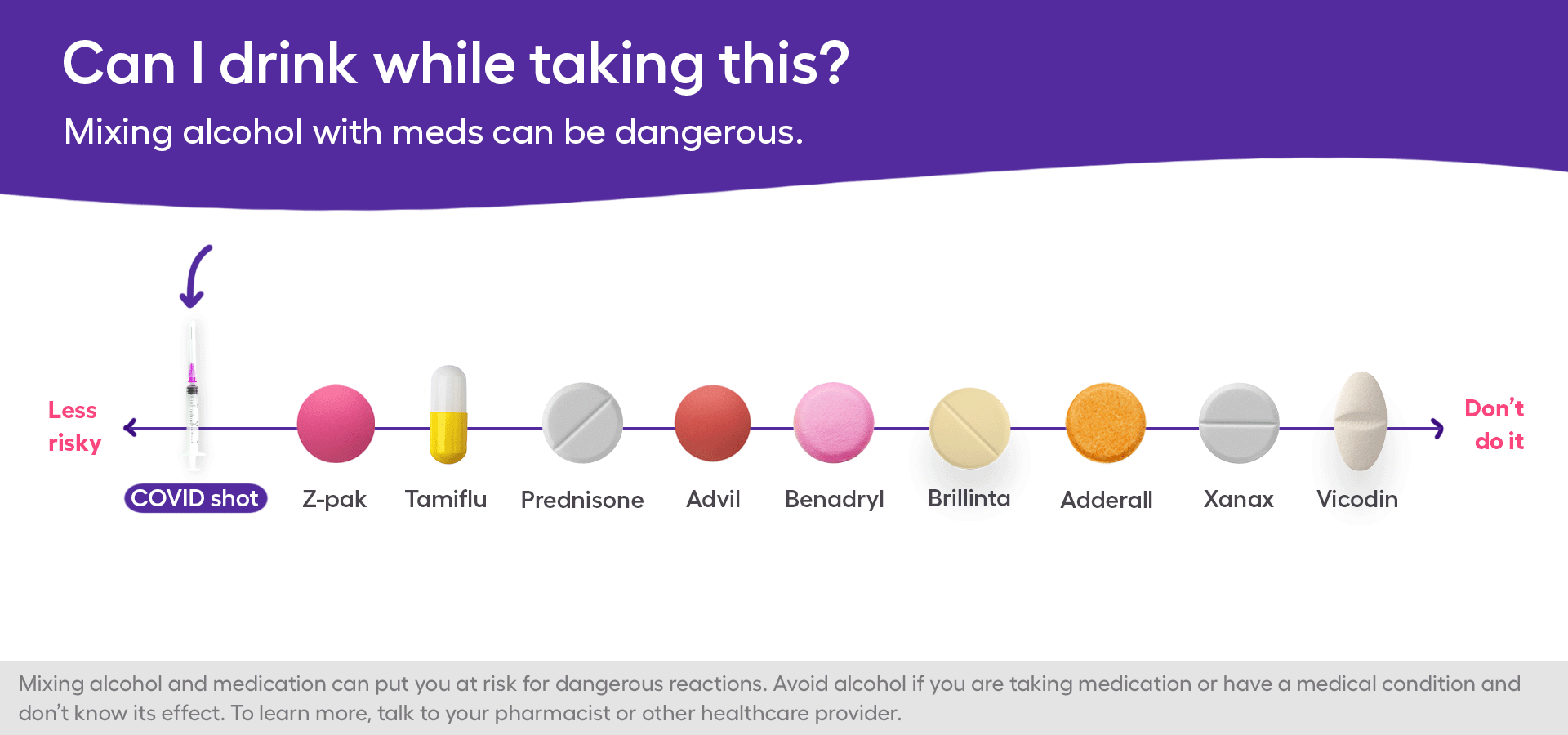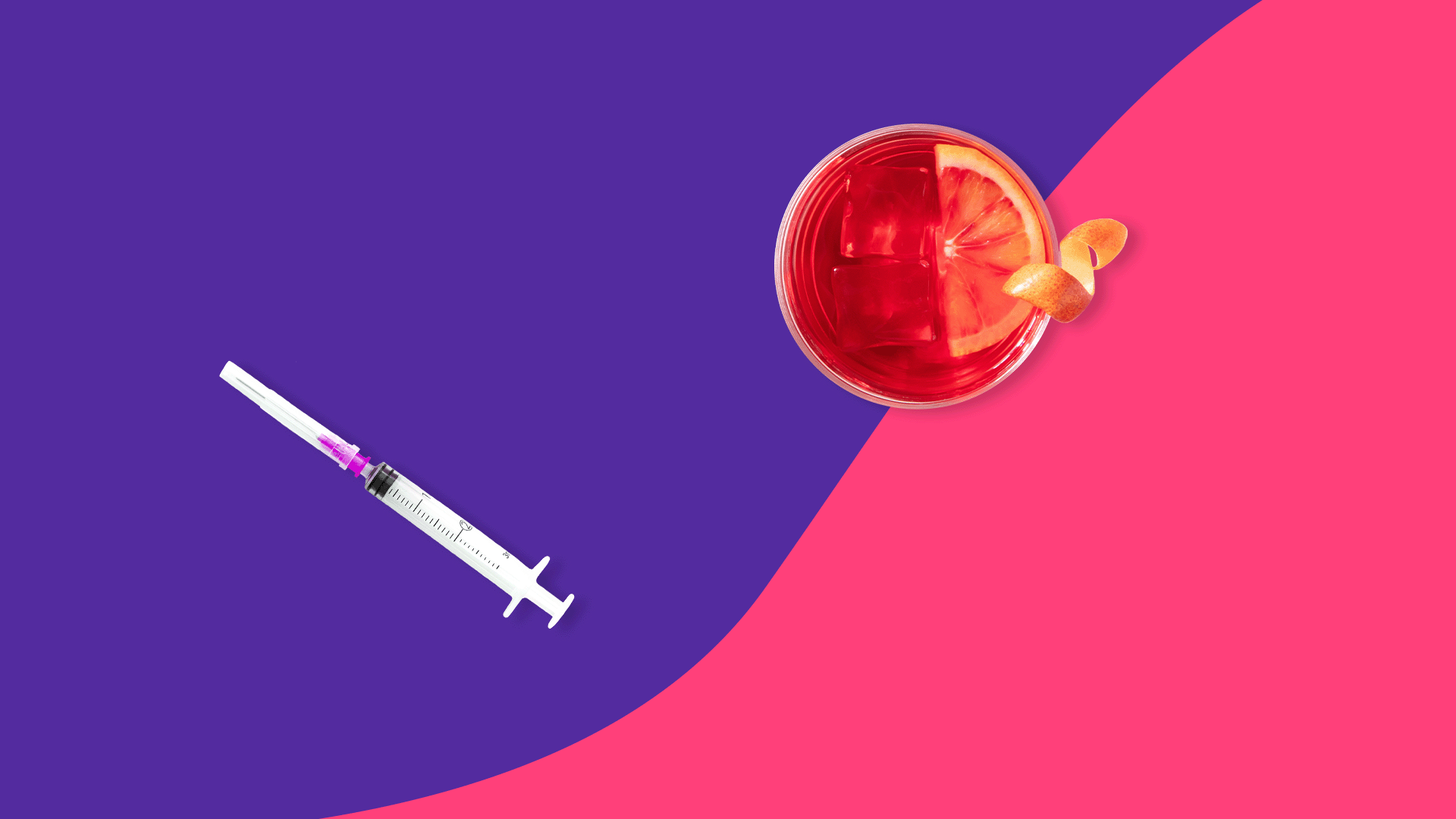Key takeaways
It is generally recommended to avoid alcohol for at least a few days after receiving a COVID vaccine to allow the body to build immunity without interference.
Drinking moderately (no more than two drinks per day for men or one drink per day for women) after a COVID vaccine is unlikely to seriously affect the vaccine’s effectiveness, but heavy or binge drinking can weaken the immune system.
There is no evidence to suggest that consuming alcohol before getting a COVID vaccine impacts the vaccine’s effectiveness, though some experts recommend avoiding alcohol 24 hours before vaccination.
Mixing alcohol with the COVID vaccine may increase the risk of experiencing side effects common to both, such as headaches and fatigue.
Whether you’re getting the COVID-19 vaccine for the first time or you’re due for a booster shot, you may be wondering whether it’s safe to drink alcohol after the COVID vaccine. You might have gotten the shot on a weekend or right before attending a friend’s birthday or wedding. No matter the case, you’re right to be concerned.
Research suggests that alcohol may have an impact on your immune system. However, there is no explicit warning about drinking alcohol on the FDA label of the COVID-19 vaccines, including those made by Pfizer, Moderna, and Johnson & Johnson. Most healthcare providers will recommend you take it easy and avoid drinking alcohol after getting the vaccine. You might not be in the mood to drink anyway due to side effects.
In addition, you might also be asking yourself, “can I drink alcohol before the COVID vaccine?” Continue reading to learn about the potential effects of mixing alcohol and the COVID vaccine.
Can I drink after a COVID vaccine?
In most cases, it’s best to avoid alcohol for at least a few days after a COVID vaccine. That way, your body can focus on building up immunity to the coronavirus without interference. However, drinking alcohol in moderation (not more than two drinks per day for men and not more than one drink per day for women) is unlikely to have a serious effect on the COVID vaccine.
There is no official government precaution against the use of alcohol after a COVID vaccine. In 2020, Russia’s top public health official recommended avoiding alcohol for two weeks before and almost two months after getting the Sputnik V vaccine. However, the vaccine’s manufacturer has since suggested avoiding alcohol for at least three days after the injection.
Can I drink alcohol before a COVID vaccine?
There is no evidence that anything you eat or drink before getting vaccinated will affect how well the COVID-19 vaccine works. However, you may want to avoid drinking alcohol at least 24 hours before getting the vaccine to err on the side of caution. Some infectious disease experts suggest that alcohol may promote an allergic reaction in individuals who are susceptible. Research has also found a link between alcohol intake and hypersensitivity or allergic reactions, possibly due to alcohol’s effects on the immune system. 
Alcohol and the immune system
Research suggests that alcohol use may affect the function of immune cells in the body. However, the amount of alcohol consumed seems to have an impact. Chronic alcoholism has been shown to weaken the immune system and promote inflammation in the body. Binge drinking for a night can also disrupt the function of the immune system. Heavy drinking can impair the ability of immune cells to travel to infected areas of the body, leading to a potentially worsened infection, among other possible complications.
One study tested the effects of alcohol in rhesus monkeys vaccinated against the poxvirus. The rhesus monkeys were given access to alcohol for seven months before being vaccinated with the poxvirus vaccine. The monkeys that were heavy drinkers were found to have a weak response to the vaccine, while those that were moderate drinkers were found to have the highest response to the vaccine. An interesting finding is that those who drank in moderation had a higher response to the vaccine than those who didn’t drink alcohol at all.
Moderate consumption of alcohol may have a beneficial impact on the immune system. Clinical trial results have surprisingly found an enhanced immune response after 30 days of moderate alcohol consumption. A decreased risk of becoming infected with the common cold has also been linked to moderate alcohol intake. Still, more research is needed to confirm the exact effects of moderate alcohol intake on the immune system.
One reason to avoid drinking alcohol with the COVID vaccine is the potential increased risk of side effects. Alcohol and the COVID vaccine may have similar side effects that overlap.
Other precautions after a COVID vaccine
You may experience side effects after getting the COVID vaccine. However, many people don’t experience any side effects from the COVID vaccine.
Both the Pfizer and Moderna mRNA vaccines are initially administered in two doses. You may notice more side effects with the first dose of the vaccine if you’ve been infected with COVID-19 in the past. On the other hand, you may notice more side effects after the second vaccine dose if you’ve never had COVID-19.
Those who experience side effects generally experience mild side effects that resolve on their own. Currently, the benefits of getting the COVID vaccine outweigh the risks of serious side effects.
Common side effects of the COVID vaccine and alcohol
The most common side effects of the COVID vaccine include:
- Injection site reactions, or side effects around the site of injection, such as pain or soreness
- Headache
- Fatigue
- Fever
Drinking alcohol can also cause headaches and tiredness, among other side effects, such as weakness, muscle pain, and nausea. Mixing alcohol and the COVID vaccine could lead to worsened side effects of the vaccine.
Serious side effects of the COVID vaccine and alcohol
Serious COVID vaccine side effects may include:
- Heart problems, such as myocarditis and pericarditis
- Blood clots (Johnson & Johnson)
- Severe allergic reactions
Inflammation of the heart muscle (myocarditis) or outer lining of the heart (pericarditis) is linked to the Pfizer-BioNTech and Moderna vaccine. Most cases have been reported in male adolescents and young adults. Although the overall risk is small, data suggests the highest rates of myocarditis occur after the second dose of the vaccine.
Blood clots and severe allergic reactions have also been reported. However, certain blood clots (or thrombosis with thrombocytopenia syndrome) have mainly been linked to the Johnson & Johnson vaccine, with cases being identified within two weeks of vaccination. Severe allergic reactions, or anaphylaxis, are a risk with all vaccinations but are generally a rare occurrence. Reports of death from the COVID-19 vaccine are also rare (0.0026%).
Alcohol use may also be linked to heart problems. Heavy drinking, in particular, can lead to cardiomyopathy, a chronic disease of the heart muscle. However, the risk of people with heart disease developing post-vaccine myocarditis is considered to be low.
Alcohol has blood-thinning properties that can become a problem for certain people who take blood thinners, such as anticoagulants or antiplatelet agents. Some people may want to take an over-the-counter (OTC) pain reliever, such as ibuprofen or Tylenol (acetaminophen), after getting vaccinated. While OTC medications may help relieve pain and soreness, mixing nonsteroidal anti-inflammatory drugs (NSAIDs), such as ibuprofen, with alcohol could increase the risk of stomach bleeding or ulcers.
When should you see a doctor
Although rare, severe adverse reactions are possible after getting a COVID vaccine. In many cases, healthcare providers recommend you stay for around 15 to 20 minutes before leaving the pharmacy or clinic where you received the shot. A healthcare professional can then monitor for any serious side effects.
You should call 911 or visit the emergency room immediately if you experience signs or symptoms of a serious reaction. These signs and symptoms may include:
- Shortness of breath
- Nausea
- Vomiting
- Severe rash
- Swelling of the face or throat
- Low blood pressure
- New or worsened cough
- Blurred vision
- Rapid heartbeat
- Dizziness or weakness
- Severe headache
You should report any medications you are taking and other medical conditions you may have to your healthcare provider. Knowing your full medical history can help your healthcare provider rule out other possible causes of the reaction and determine the best treatment option for you.
The Centers for Disease Control and Prevention (CDC), along with the Federal Drug Administration (FDA) and other agencies, is constantly monitoring vaccine safety through data reported through the Vaccine Adverse Event Reporting System (VAERS) and the Vaccine Safety Datalink (VSD).
You can also report any adverse effects of the COVID vaccine to the FDA and CDC by calling 800-822-7967 or online through the VAERS portal.
The bottom line
After reading this article, you should have a better understanding of the answer to your question, “Can I drink after a COVID vaccine?” As always, whether you can mix alcohol and the COVID vaccine depends on your specific situation, overall medical condition, and the amount of alcohol you consume. It’s best to play it safe and avoid alcohol on the day you’re getting vaccinated and for a few days afterward. Abstaining from alcohol could help the vaccine do its best at promoting an effective antibody response and protecting you from infection throughout the pandemic.
If you decide that you are going to drink after the COVID vaccine, you may want to limit how much you drink. Binge drinking or drinking heavily over time is linked to a weakened immune system. However, drinking in moderation is unlikely to increase side effects or diminish the effectiveness of the COVID vaccine.




